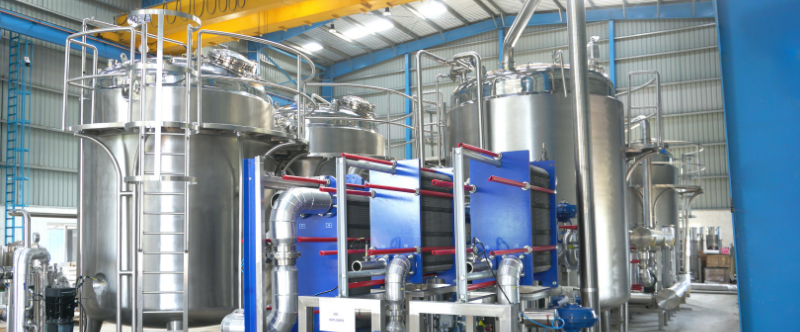Manufacturing pharmaceuticals is as complex as it is fascinating. There are several specific manufacturing processes and stringent regulations and protocols that need to be followed.
While all of these are made with extra caution and clinical care, parenteral solutions are one of the most sensitive products that the manufacturers produce. Especially when it comes to Large Volume Parenteral Products or LVP manufacturing, it is important to have an understanding of the parenteral manufacturing process to have a macro perspective on the complex operations of pharma.
What is LVP or Large Volume Parenteral?
As mentioned above, LVP refers to Large Volume Parenteral. To understand large-volume parenteral, we first need to understand what are parenteral solutions. In pharma, parenteral solutions are defined as drugs that are directly administered to the human body by injecting it straight into the bloodstream or absorbed through one or more layers of skin or mucous membranes.
Subsequently, LVP can be understood as sterilized and injectable aqueous solutions that are packaged in single-dose containers and ready for rapid transit.
The main ingredient of LVPs is water, with an active substance added to it for specific purposes. The active drug used in this case can vary depending on the end users, but some of the common active drugs in the LVP include dextrose, dextran, salt, proteins, amino acid, and albumin in varying percentages.
During the parenteral manufacturing process, the production batch for LVPs, as the name suggests, is usually massive, with specialized facilities having thousands of liters of production capacity.
Some of the most common types of LVPs are:
- Electrolytes (Cardioplegia)
- Drug Premixes
- Contrast agents
- Carbohydrates
- Nutritional (Hyper-alimentation)Solutions, such as proteins and lipid emulsions
- Peritoneal Dialysis
- Irrigating Solutions
- Blood derivatives such as albumin
Large Volume Parenteral(LVP) Manufacturing Process
The Set Up
Due to their highly sensitive use case, it is absolutely crucial to have the optimum manufacturing that guarantees complete quality control. The sanitation standard of the facility, proper temperature control, a highly qualified team with relevant specialization and strict standards of personal hygiene, tailor-made process vessels, and secure holding, filling, and storage areas are all important factors to ensure parenteral products with complete integrity and reliability.
The Process
The manufacturing of LVP starts with the introduction of Water for Injection (WFI) in the manufacturing vessel. Of course, the Water for Injection (WFI) is adequately prepared before this stage using specific processes.
The WFI enters the manufacturing vessel, usually at 85°Celcius. The temperature of the WFI is then brought down to 25 °Celcius using a chilled water jacket.
After this, the API or Active Pharmaceutical Ingredients are added to the solution depending on the end user requirement.
Next, nitrogen is used to create adequate pressure to force the solution to move through the pipes and get collected in suitable vessels.
The product then enters a filtration system. Generally, activated carbon powder is added to the bulk product and subsequently removed to achieve particulate removal filtration.
After the process of filtration, the product is moved to the holding vessels, and from there, it is transferred to the filling area. LVPs are usually packed in containers with a capacity range between 100ml to 1L.
To summarise, some of the distinguishing properties of the Large Volume Parenteral(LVP) are:
- Packaged in glass bottles or in large-volume containers
- Packaged in quantity between 100ml to 1L
- Sterile
- Pyrogen-Free
- No particulate matter
- No anti-microbial agents
- Isotonicity
- Meant for long-term use
It is essential to note that the manufacturing vessel and the holding vessels go through set procedures of CIP (Cleaning-in-Place) and SIP (Sterilization-in-Place) after every manufacturing operation.
Challenges Faced While Manufacturing LVPs
Just like every pharmaceutical manufacturing process, technological advancements have brought major changes in Large Volume Parenteral manufacturing process, making the process more efficient and fail-proof. However, the lowest visible and subvisible particulate levels are currently a hot topic, with every major LVP manufacturer spending resources on perfecting the best practices. Nevertheless, there are challenges that all major LVP manufacturers face.
Many factors, such as bacterial endotoxin, particulate matter, and bioburden, might adversely impact the manufacturing quality.
One of the issues can be the timing between washing, drying, and sterilizing. If the time taken between the processes is too long, it can contribute to the generation of endotoxins and microbial growth on the stoppers compromising the integrity of the whole operation. The unavailability of sterilized packaging can also be a deterrent to the manufacturing operation.
Lack of communication between pharmaceutical manufacturers and packaging partners can also be a major reason for downtime in the process. While having an agreed-upon validation guidelineresolves this issue, for other issues, usually sticking to the cGMP requirements takes care of most other issues. For example, following proper guidelines for sterilization has a direct connection with reducing the endotoxins levels in the final product.
Choosing the Right LVP Manufacturing Facility
For pharmaceutical business owners, selecting the right LVP manufacturers is of paramount importance. It is absolutely crucial to zero in on operations that have specialized expertise in the field and can cater to specific demands.
Some of the pointers that can help an LVP manufacturing facility stand out to include the following:
- Energy efficiency
- Magnetically powered operations with no seals or shafts to reduce the risk of contamination
- Ability to mix till the last drop
- Adequate CIP and SIP measures
- Proper and up-to-date validation documentation
With over 20 years of experience in the business, TSA is one of the leading names in the country for high purity water solutions. TSA is equipped with LVP manufacturing capabilities that ensure complete integrity and reliability. With a detail-oriented approach and a penchant for perfecting process procedures and overcoming complex challenges, TSA has emerged as the trusted partner for the most respected names in the pharma, biopharma, and biotech sectors.






